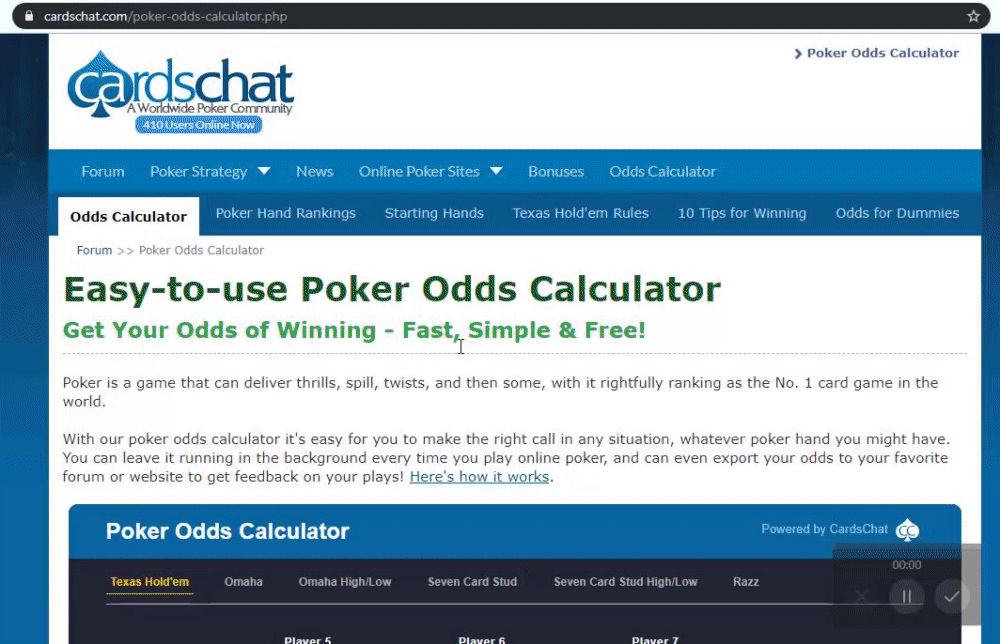Poker Odds Calculator Online
Posted By admin On 21/07/22How Our Poker Calculator Online Works
Use the poker odds calculator from wizardofodds.com when you play on line poker, and vastly improve your chances of winning in Texas Holdem or any other poker game. Every woman loves a man who knows his odds. So quickly determine the odds of winning specific hands of poker. A poker odds calculator is a piece of poker software that lets you run any scenario that you see at a poker table. Once you can see what cards you have, and what cards other players have, the poker calculator will go to work and, in a matter of seconds, tell you what your odds of winning are.

First, a clarification: the top poker odds calculator won't work while you're in the middle of a hand (there's simply not enough time to enter all the details) but it's great if you're having a session going through old hands.
- The Poker Odds Calculator tells your winning probabilities for Texas Hold'em, Omaha & more. Know your winning chances on Spartan Poker and start playing online poker.
- The free online poker odds calculator below calculates Texas Hold'em odds in heads up play. Just choose your hole cards and starting hand of your opponent and click the „Get Odds“ button and the free calculator will calculate winning poker odds of each hand. With the help of this free poker odds calculator you can also calculate Texas Holdem poker hand odds pre-flop, on the flop and up to the turn.
- The Poker Hand Range Calculator calculates Texas Hold'em hand ranges from percentage values and vice-versa. All this online and free. Setup a poker range by selecting the hands in the poker hand calculator and share the link which is automatically generated for you.
So, how does the OnlinePoker.com poker odds calculator work in reality
Well, it takes a few factors into consideration:
- We have 52 cards in the poker deck
- We know how many cards are left in the deck after cards have been dealt out
- We know the number of outs (cards left) that we need to make a winning hand
- We know what those outs are
Once we know all these factors, the online poker calculator works out whether you were in a winning position or not.
Using our online poker odds calculator is easy: select your chosen game (Hold'em, Omaha, Omaha Hi-Lo, 7-Card Stud etc) and click on the cards on-screen to make your theoretical hand.
Once your hand is displayed, you can select your opponent's hand. Click on the 'Deal In' button to bring in another hand and select the cards on-screen to help form an opponent's hand.
Once you've finished, you can start selecting cards to be displayed as community cards. Select three to see what your odds would be on the flop, or add a Turn card to see what your odds would be after the Turn, and so on.
Once you have your board set up, click the 'Calculate Odds' button and your hands odds will be displayed on-screen. Now you can see whether you should have called that raise by your opponent or laid your hand down.
How the poker calculator works
Online Poker Odds Calculator Free
The Grosvenor Casinos Poker Calculator works by using what’s known as a “Monte Carlo” algorithm. This algorithm estimates the percentage of making a hand in Texas Hold’em by simulating what would or could happen had the hand been played out multiple times. The calculator runs all the possible outcomes of the hand from the point at which the player is on the board until it hits a limit of 12,500 simulations.
Why 12,500?
Online Poker Odds Calculator Software
To ensure a perfectly accurate percentage each time, one would need to run hundreds of thousands of simulations, which would cause the calculator to run much slower – especially where there are no board cards. Instead, we have chosen to impose a limit of 12,500 possible outcomes, which means the calculator is within 1.5% accuracy of the displayed percentages. For calculations that have less than 12,500 outcomes (when the hand progresses further) the calculation is more accurate. To ensure the tool calculates hand percentages as quickly as possible, the calculations run on a separate server – as opposed to the individual’s computer.